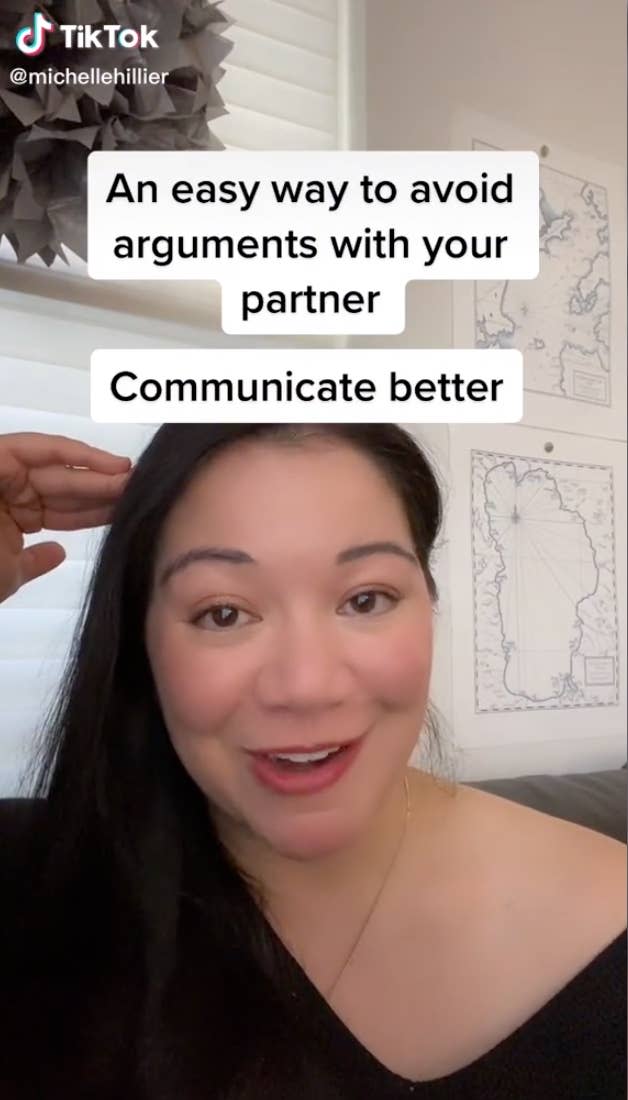"The Majority Of People Have Been Communicating With Their Partners Incorrectly" — This Woman Explained How Couples May Be Able To Avoid Unnecessary Arguments In A Simple Way
A mindset coach named Michelle Hillier recently gained the attention of nearly a million people when she made this viral TikTok about how couples can avoid unnecessary arguments:
@michellehillier Are you communicating effectively with your partner? #nlp #communication #learnontiktok #relationshipadvice
♬ Michelle Hillier Author of Inspired Magic - Michelle Hillier - Author
In her video, she explains, "Everybody knows that the key to a healthy relationship is communication, but the majority of people have been communicating with their partners incorrectly, thus causing little fights to occur every now and then. There are two kinds of communicators – those who tend to be literal and those who tend to be inferential."

"Let me show you how you know which one you are. Let's pretend you and I are sitting in a living room and you and I are really good friends and I say to you, 'I'm really thirsty.' Now, did you feel all of a sudden compelled to jump up and get a drink for me from the kitchen, or did you think, 'Well that was interesting information'?"
WE TV
"If you're somebody who felt overly compelled to quench my thirst and get me something to drink, you are inferential. I never said, 'Please get me something to drink,' you infered it from the information I gave you."
Hulu
"If you thought, 'Oh that's good information,' you're most likely more literal – you needed somebody to explain to you literally what they want in order for you to take action."
NBC
"This tiny little difference is actually the cause to many not-necessary spats that happen in relationships. For instance, imagine that you have told your partner 10 times to take out to garbage – you're inferential and he's literal. Imagine you're saying 'the garbage is piling up' or 'that trash smells really bad' – neither of those are actually asking a person to do the action of taking out the trash."
Brown Sugar App
"So, let's say you're inferential, and this person is literal. Instead of 'woo this trash smells bad,' if you said 'will you please take out the trash' – even better, give a time frame: 'Will you please take out the trash during the commercial?' This one little change will make a huge difference in your relationship."

"Most people communicate the way that they receive information. So if I'm literal, I speak literally to somebody else – that can also cause issues because imagine if my partner is inferential and I'm saying things very directly. They almost feel like they are getting pounded with a ton of bricks. This is why when a lot of people are communicating, one person thinks they are just saying something they need and the other person thinks they are getting beat on or vice versa. So, making this one change – finding out if your partner is literal or inferential – and communicating in the way that they receive information will hugely make a difference in your relationship," she concluded in her TikTok.
BuzzFeed reached out to Michelle who has eight years of experience in the Neurolinguistic Programing (NLP) field. She is also the author of Inspired Magic: Your Guide to Transforming Your Life With the Power of the Mind.
The information in her TikTok is all based on Meta Programs and Neurolinguistic Programming NLP. "This topic is enormous, but I'll break down one small part that accounts for many of the fights couples have. First, it's important to understand a few things about the brain and how we communicate. Our brains are receiving as much as 11 million bits of information per second through our different senses, though we're only able to grasp around 100 bits of this information per second. This requires us to have filters that help sort through the information to process, understand, and make decisions," she explained.
@michellehillier Reply to @klucia92 top questions answered #relationshipadvice #communication
♬ original sound - Michelle Hillier - Author
Michelle said that some of these brain filters are called Meta-Programs, according to NLP. "The Listening Filter, in particular, is under the umbrella of what is called Complex Meta Programs. This filter is particularly important in relationships because how we listen affects what we comprehend," she said adding that she discussed the two types of listening styles – literal and inferential – in her TikTok.
@michellehillier Reply to @tinyandme2 when things get defensive #relationshipadvice
♬ original sound - Michelle Hillier - Author
"When couples have different communication styles it can lead to fights and misunderstandings. An inferential listener is someone who reaches their own conclusion of what is being communicated based on the information they are hearing. Literal listeners take the information at face value and pay attention to the exact content given."
"Fights and arguments can easily arise when two parties believe they are communicating their needs effectively and their partner isn’t actually comprehending the request. Basically, one or both people get upset because they aren't feeling heard, respected, or helped. These small fights could be avoided by grasping how the other person best receives information and making a conscious effort to communicate with their partner in that way," she said.
@michellehillier Reply to @mrs.meganwalther are all women infernetial? #communication #nlp #womenoftiktok
♬ original sound - Michelle Hillier - Author
Michelle said that when it comes to communication, the person responsible for adapting the message is the person saying it, not the person receiving it. "If you want to bypass the 11 million bits of information your partner is receiving at that moment, it's best to use words, phrases, and tones that fit their style."
There are many ways to become better at communicating with your partner, according to Michelle. "The first step is simply deciding to put in the effort and learn more about your partner's way of processing information."
@michellehillier Three tips to help any relationship #lovelanguage #relationshipadvice
♬ Michelle Hillier Author of Inspired Magic - Michelle Hillier - Author
In her TikTok, Michelle explained how you can tell if you're more inferential or literal when it comes to listening styles, but she said it's also important to know what you and your partner's speaking styles are. "Here's how you can tell: If you felt that someone at work was not performing as well as they should, would you come to the point and tell them directly, or would you hint simply and give them clues? In this example, the first person has a literal speaking style and the second has an inferential speaking style."
She then shared her tips for communicating with each style. "If you are speaking to an inferential listener but you are literal: Tone of voice is important when speaking to an inferential listener. Being too direct can feel harsh and get taken the wrong way. By simply softening your tone and adding 'please' and 'thank you' to the request, your inferential partner will connect with the message more easily. On the other hand, if a literal listener doesn't understand what their inferential partner wants, asking, 'what specifically would you like me to do and when would you like me to do it?' will help your partner give you more clear directions. When speaking to a literal listener if you are inferential, being direct and clear is the ticket to getting anything done," she said.
"Many inferential communicators have a hard time being direct in the beginning, but it gets easier and ultimately it's what your partner actually wants! And no matter what kind of listener you are speaking to, make sure you tell them what you want them to do versus what you don't want them to do. The unconscious mind has a hard time processing negatives so when you tell them what you don't want them to do, you end up reinforcing the message you want to avoid. (PS: this is gold for anyone looking to communicate better with their children)."
The occasional misunderstandings and arguments happen, but Michelle believes that if there are daily disagreements, there's more going on under the surface. "I’ll often see men and women who thought fighting is 'just what couples do' – that definitely isn’t the case. Toxic communication signs include name-calling, gaslighting, blaming, consistent shouting, purposefully manipulative language, and refusal to work on better communication, to name a few."
@michellehillier Reply to @lefroop pay attention to red flags
♬ original sound - Michelle Hillier - Author
